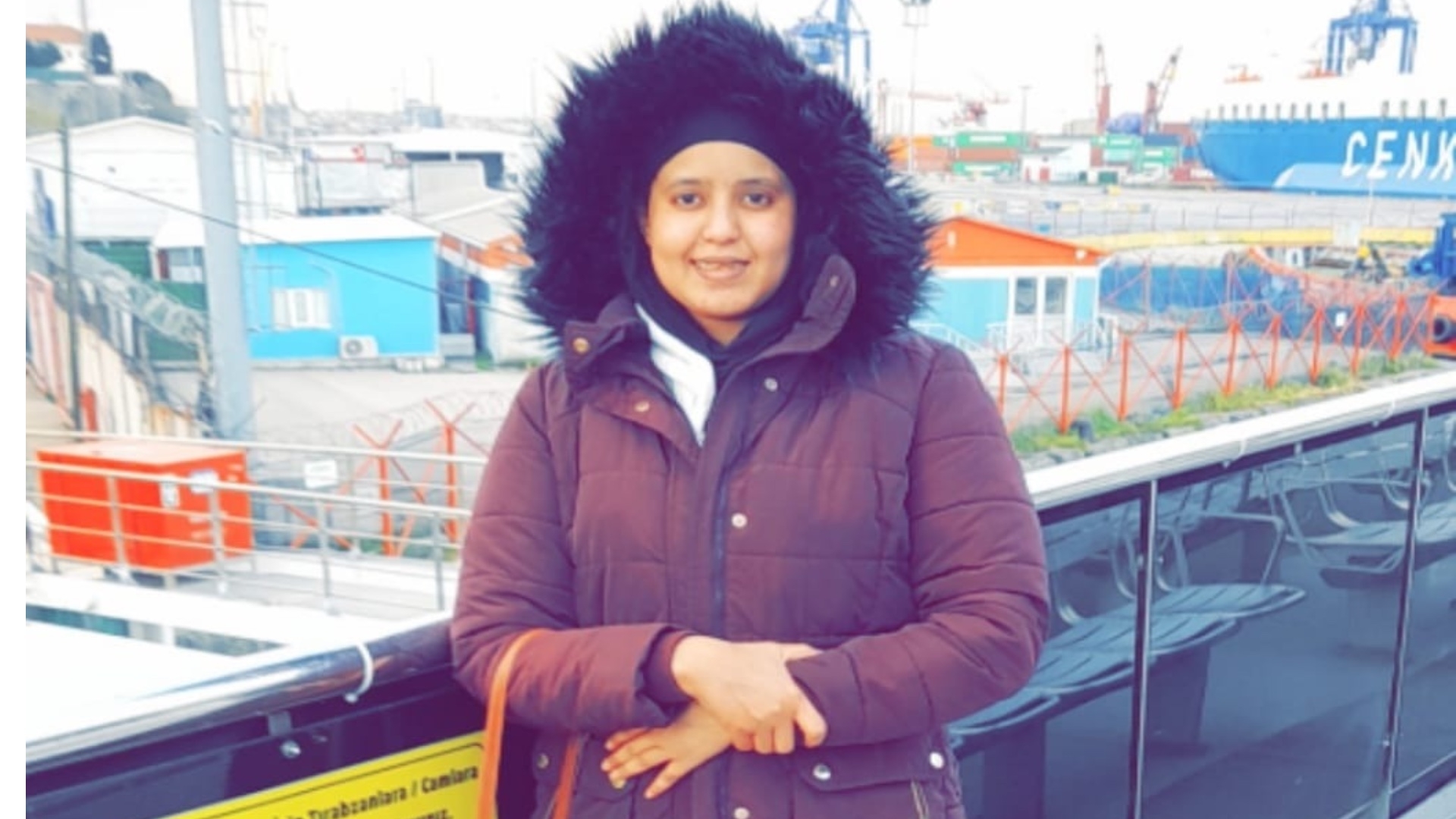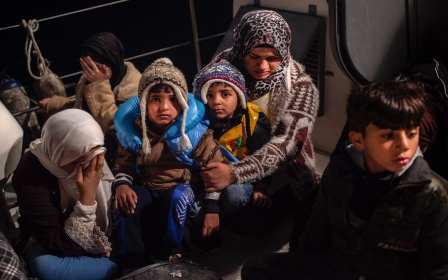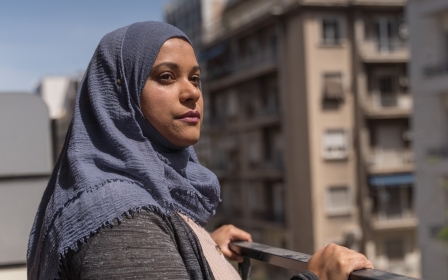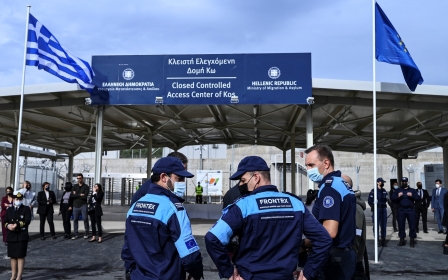Asylum seekers are disappearing on Greek islands

The fear of pushbacks by the Greek coastguard is forcing many asylum seekers to flee into unknown territory to avoid being detained by the authorities when they arrive by boat on the Greek islands.
Civil actors have reported a spike in disappearances, and even deaths, of asylum seekers since 2020, but, with a limited NGO presence on the islands, many of these cases are going undocumented.
In June 2022, Bashiir Abdikariim Mohamed, a Somali man, arrived by boat on the Greek island of Chios, one of about 32 people who had boarded the vessel in Turkey.
As soon as they came ashore, the group quickly dispersed, fearing detection by the authorities. Mohamed with 11 others fled to the mountains.
"We were up there for five days," Mohamed told Middle East Eye via an interpreter. When they reached a point that was too risky to cross, the women in the group refused to turn back.
Stay informed with MEE's newsletters
Sign up to get the latest alerts, insights and analysis, starting with Turkey Unpacked
"They said they'd rather risk their lives" than go back down, he said.
Mohamed and three other men decided to turn back to bring them water, as they had not drunk any for days. On the way down, they were intercepted by police.
'They just went to collect the bodies'
- Bashiir Abdikariim Mohamed, Somali refugee
"We told them that there were people still stranded on the mountain," he said.
Mohamed insisted that he wanted to take the women food and drink himself, but the police assured them that they would send a rescue team.
"They kept repeating that they were safe in Europe."
Mohamed was taken to a camp. He was then transferred to an airless container, his arms painfully bound with cables, then put on a boat and deposited on an island between Greece and Turkey.
His phone was taken from him, and he was left with nothing but a life-vest.
Mohamed later found out that the body of one of the women, 24-year-old Huda Hussein Adan, had been discovered. A coroner's report later said she had died of exhaustion due to hunger and thirst.
"I couldn't take this, it was too much for me... [the authorities] must have gone too late. They just went to collect the bodies," Mohamed said.
According to Ruhi Loren Akhtar, CEO of Refugee Biriyani & Bananas, two other women who went missing have still not been found.
"The ombudsman was contacted, different agencies were contacted... asking for a search to happen, but that never happened. There was no accountability [about] what happened to this woman," Akhtar said.
Vacuum of accountability
Akhtar and Madi Williamson are part of a network of volunteers that functions as an informal hotline taking distress calls from people on the Greek border.
Williamson began collecting pushback testimonies from undocumented people on the Turkish border in 2020, when she was working as a nurse doing casework for NGOs. Since then, she has become one of the default contacts for refugees in distress.
However, Williamson's ability to help is limited. The heightened risk of criminalisation has chased many NGOs and civil actors from the region.
"The trick is to always convince people to call [the emergency services]... there's just nothing else rescue-wise that can be done, no NGOs are allowed to intervene. There's not really much else that we can do," Williamson told MEE.
The crackdown by the Greek authorities on NGO activities in the region has created a vacuum of accountability on the islands, with many disappearances going undocumented.
'We've heard stories of people being arrested and taken to prison where they're not given a translator. They're not given a lawyer. They're not given a phone'
- Madi Williamson, nurse and activist
In a press release on 25 May, the NGO Doctors Without Borders estimated that 940 refugees had gone missing on the island of Lesbos.
According to Williamson, the figure is likely to be much higher.
"If you tally up the number of people, even just the number of people who go missing... we truly have no idea," Williamson said.
"We've heard stories of people being arrested and taken to prison where they're not given a translator. They're not given a lawyer. They're not given a phone. This one guy said that he was taken to a mental hospital and sedated for like a year, and then just thrown back on the streets."
For Tommy Olsen, a Norway-based volunteer who runs Aegean Boat Report, which monitors people movement in the Aegean Sea between Greece and Turkey, the surge in disappearances corresponds to a heightened risk of pushbacks.
"People contact me when they have arrived... they have run from the beach and into the woods somewhere," Olsen told MEE.
"They're basically scared to be found by the authorities because most of them who I speak with have tried [it] many times before," Olsen said. "They have been beaten, they have been robbed. Some of them have been raped. Of course, they have every reason to be afraid.
"So it's not about what they read... it's about personal experience, right?"
A form of intimidation
In 2020, a prosecutor on the island of Kos charged Olsen with crimes related to alleged smuggling. Before that he was able to collaborate with local NGOs to coordinate rescues.
"[The NGOs] told me, please don't call us any more. We can't do something with the information you provide because the Greek authorities say you're a criminal," Olsen said.
Williamson was arrested in Chios in May 2021 following the announcement of an investigation into more than 30 NGOs and civil actors in September 2020.
"That silenced a lot of those groups. Some of them shut down. Some people left Greece and started operating elsewhere," Williamson said.
Williamson had all her devices removed and was strip-searched by the authorities. This marked the beginning of a drawn-out investigation that is still continuing.
"We're very aware that that's just a form of intimidation. There's no legal basis to it whatsoever. We're not going to stop because... even if we can't stop people from being pushed back... we can at least be aware of how often it's happening and how it's happening," she said.
Middle East Eye delivers independent and unrivalled coverage and analysis of the Middle East, North Africa and beyond. To learn more about republishing this content and the associated fees, please fill out this form. More about MEE can be found here.




